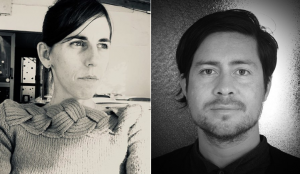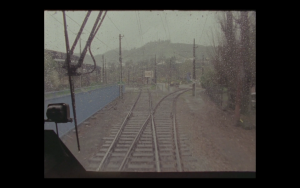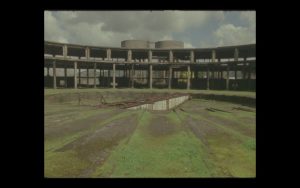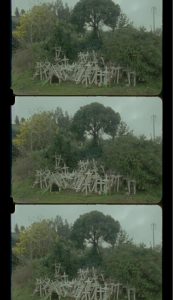«We film little, and in these times, it is also a declaration of principles»

We interview filmmakers Teresa Arredondo and Carlos Vásquez Méndez after the premiere of their movie The Crosses at Open City Documentary Festival in London. Arredondo is a psychologist and filmmaker, her work in cinema revolves around the autobiographical. Her first work is a portrait of the last years of her grandmother, writer Matilde Ladrón de Guevara. Her first feature film, Sibila, received numerous awards at festivals around the world. She is a FIDOCS programmer and is co-founder of the Laguna Negra studio with Vásquez, with whom she develops different experimental and essay documentary film projects.
In the case of Vásquez, he is an artist and researcher. He uses cinema and photography from documentaries and an experimental perspective, establishing constant correspondences between artistic practice, social sciences, analog and digital. His works have been exhibited in various exhibitions and festivals. In 2016 his film [Pewen] Araucaria received the Joris Ivens / Center National des Artes Plastiques (France). With a bachelor of Cinema, a Master of Creation Documentary (IDEC / UPF) and a Master of Contemporary Artistic Creation (UB), he is currently developing his doctoral research.

1. What does it mean for you to present Las Cruces in London?
It is our premiere in the UK, it is always interesting to hear the opinions of audiences other than Chilean and Latin American, who unfortunately share a dark part of our recent past and take the history of the film to our particular territories. That is why it is important to contrast the universality of this story about these heinous crimes, which although it arose in a particular context, speak of the banality of evil, about the economic sector as the factual power, about how the official history is written from the spheres of power.
2. What was the reception like in the United Kingdom?
In the Bertha DocHouse room all tickets were sold, we were surprised by the response of the London audience.
3. Las Cruces was recorded in 16mm, why this format?
We work in 16mm because we both learned cinema at film school – we understand cinema in this format and we are still trying to remain faithful to this material. More than a fascination for the plastic characteristics of the film image, we are interested in the methodology involved, the material is expensive, scarce and delicate, it forces us to prepare a lot every shot, rehearse, be very concentrated, film little. And in these times, it is also a declaration of principles: let’s say it is a conscious position as opposed to the banalization of images in the era of social networks.
4. Why did you decide to make this documentary?
This case has several peculiarities with respect to the totality of crimes of the dictatorship. The first is the participation of private in the crimes, the second is that there are confessions of the perpetrators, the third is the time that justice has been taken in issuing a sentence and this is a very symptomatic detail of the symbolic relevance of this case. Because it would be the first time that a company of a powerful family is imputed as a direct accomplice of crimes of disappearance and murder of Chilean citizens for their political ideas.

5. What was the response among the relatives of the 19 murdered?
They always agreed with the project, although we gave voice to the testimonies of the murderers instead of theirs. From the beginning they understood the central idea of the film and collaborated in every world without impositions or any conditions. They helped in the election of the inhabitants of the town who read the judicial documents, since the only condition we put to the relatives was that we did not want to expose them or submit them for reading in front of the camera. Our intention was to take care of them, work alongside them, not use their suffering.
6. What are you working on now?
The next thing is an exhibition in Port Bou at the end of September around the figure of Walter Benjamin and his tragic death. I have prepared a film piece – experimental medium-length film – about his trip through the Eastern Pyrenees before his life was taken away. With Teresa, the co-director of Las Cruces, we are working on three new projects together. The new pieces focus on the treaties on colonial history in Chile, from Spanish colonization to the planned colonization of citizens of northern Europe in the 19th century and the current post and neo-colonization of the most peripheral provinces. We have a studio called Laguna Negra, after Las Cruces, we really want to get a new movie together soon, hopefully we’ll have something next year.



